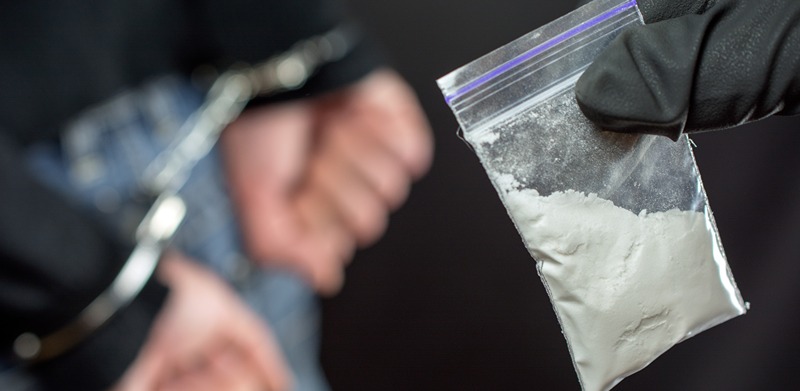Drug Charges Elevated to a Felony

This article discusses the following:
Drug charges elevated to a felony in Arizona complicate an already distressing situation.
Under Arizona Revised Statutes (A.R.S.) § 13-3401 to 13-3423, certain circumstances can cause a misdemeanor drug charge to be classified as a felony.
While this reclassification brings about increased legal considerations, it also carries broader implications for your life, potentially affecting employment, housing, and basic civil liberties such as the right to vote.
At Kolsrud Law Offices, we are well-versed in the intricacies of Arizona's drug laws and understand the gravity of the situation you're facing.
That's why we're committed to offering not just expert but also empathetic legal defense. Our aim is to guide you through this difficult time with the assurance that you're backed by a team that genuinely cares for your well-being and is skilled in defending your rights.

What is a Felony Drug Charge
In Arizona, a felony drug charge is a severe criminal allegation involving unlawful possession, distribution, or manufacturing of controlled substances.
Criteria that often lead to a felony charge include the type of drug involved, such as Schedule I drugs like heroin, LSD, or fentanyl, and the amount of drugs in possession, which might imply an intent to distribute. Previous criminal history, especially drug-related convictions, can also elevate a new charge to felony status.
For example, being caught with a large amount of methamphetamine could lead to a Class 2 felony charge under A.R.S. § 13-3407, which implies possession with the intent to distribute. Similarly, a person found with numerous individually packaged units of cocaine could also face a felony charge based on the packaging's implication of intent to sell.
Contact us today to schedule a
FREE CONSULTATION and learn
how we can help you.
What is a Misdemeanor Drug Charge
A misdemeanor drug charge is a less severe categorization compared to a felony but still carries its own set of legal repercussions.
A misdemeanor drug charge typically involves smaller amounts of controlled substances and is often linked to personal use rather than intent to distribute.
For example, being caught with a small amount of marijuana for personal use might lead to a misdemeanor charge, particularly if it's a first offense and there is no evidence of intent to sell or distribute.
Similarly, unlawful possession of certain prescription drugs in small amounts, such as a few pills of a Schedule IV substance like Valium without a valid prescription, can also result in a misdemeanor charge under A.R.S. § 13-3406.
Although less severe than felonies, misdemeanor drug charges can still impact your life. Penalties may include fines, mandatory drug education or treatment programs, and even short-term jail sentences.
Why Was My Misdemeanor Charge Elevated to a Felony Charge
In Arizona, a drug charge that initially appears as a misdemeanor can sometimes escalate to a felony charge. This elevation generally occurs due to specific circumstances or aggravating factors. Understanding the reasons for this escalation can help you better prepare for your defense.
- Amount of Drugs: Having large quantities of a controlled substance may push your misdemeanor charge to a felony.
- Prior Offenses: A history of drug offenses can increase the likelihood of a felony charge.
- Intent to Sell: If evidence suggests you intended to distribute the controlled substance, this could change a misdemeanor to a felony.
- Presence of Firearms: Having a weapon at the time of arrest can also raise the stakes.
- Location: Being caught near a school zone or in a place where drugs are not allowed can escalate charges.
➤Example 1: Amount of Drugs
You might be initially charged with a misdemeanor for possession of a small amount of marijuana. However, if you possess a substantial amount, say several pounds, the charge could escalate to a felony under Arizona's drug laws.
➤Example 2: Intent to Sell
Let's say you're caught with a Schedule II drug like cocaine. Possessing a few grams might result in a misdemeanor charge. However, if you're also found with baggies and scales, authorities might infer an intent to sell, elevating the charge to a felony.
➤Example 3: Prior Offenses
Imagine being caught with a Schedule III drug like an anabolic steroid. If it's your first offense, you might be charged with a misdemeanor. But if you have prior drug offenses, you could be looking at a felony charge.
➤Example 4: Presence of Firearms
If you are caught with a small amount of a Schedule IV drug like Valium, you might initially be charged with a misdemeanor. However, if you're also found in possession of a firearm at the time of your arrest, the drug charge could be elevated to a felony. Under Arizona law, the combination of drugs and firearms can be viewed as an aggravating factor that increases the severity of the offense.
➤Example 5: Location
Suppose you are caught with a small amount of a Schedule III drug in a regular setting; you might face a misdemeanor charge. However, if you are caught with the same amount but are within a school zone or a drug-free area, you could see your charge escalate to a felony level. Arizona law takes the location of the offense seriously, especially if it involves vulnerable populations like children.

What is Possession with Intent
Possession with intent to distribute or sell is a specific legal term used in Arizona to denote a severe form of drug offense. This charge implies that not only did an individual have control over a controlled substance, but they also intended to sell or distribute that substance. This category of drug charges is considered more severe than simple possession and comes with heavier penalties.
➤Factors Indicating Intent
- Quantity: Large amounts of a controlled substance usually indicate an intent to distribute rather than personal use.
- Packaging: Presence of multiple baggies, scales, or other packaging equipment can be considered strong evidence of intent to distribute.
- Communications: Text messages, phone records, or eyewitness testimonies discussing the sale or distribution of the substance can be critical in building a case for possession with intent.
- Location: Being caught near known drug-trafficking areas can further strengthen the charge of possession with intent.
➤Legal Consequences
Under Arizona Revised Statutes (A.R.S.) § 13-3407, the legal consequences for possession with intent to sell Schedule I or II controlled substances can result in a Class 2 felony.
For substances categorized under Schedules III, IV, and V, the charges can vary between a Class 3 to Class 5 felony, depending on the specific circumstances and amount of substance found.
What Kinds of Drugs May Lead to a Felony Drug Conviction
The type of drug in question is pivotal in determining the severity of a drug possession charge in Arizona. The state's drug laws categorize substances into different schedules, as per Arizona Revised Statutes (A.R.S.) § 13-3401, to assess their abuse potential and medical utility.
➤Types of Drugs Often Leading to Felony Charges:
- Schedule I Drugs: Such as heroin, LSD, and fentanyl. These have a high abuse potential and no recognized medical use.
- Schedule II Drugs: Including cocaine, methamphetamine, and certain prescription opioids like Oxycodone.
- Schedule III Drugs: Such as anabolic steroids and some barbiturates, under certain circumstances.
- Schedule IV Drugs: Like benzodiazepines (e.g., Valium, Xanax) can also lead to a felony if you're caught with large quantities or are found to be distributing them.
➤Schedule I Drugs
Schedule I drugs are the most likely to result in a felony charge due to their high potential for abuse and lack of accepted medical use. Heroin, LSD, and fentanyl are common examples.
Being caught with even a small amount of a Schedule I drug can result in a Class 4 to Class 6 felony charge under A.R.S. § 13-3407, carrying penalties that may include several years in prison.
➤Schedule II Drugs
Schedule II drugs also have a high potential for abuse, but some may have limited accepted medical uses. Cocaine and methamphetamine fall under this category. Possession of these substances often leads to a felony charge, with the possibility of substantial jail time.
➤Schedule III and IV Drugs
Although Schedule III and IV drugs have a lower potential for abuse, they can still result in felony charges under specific circumstances. For example, possession of large quantities or evidence of distribution or manufacturing can elevate the charge to a felony level
Can Prescription Drugs Lead to a Felony Charge?
In Arizona, possession of prescription drugs without a valid prescription can result in serious criminal charges. The state classifies drugs into various schedules, as per Arizona Revised Statutes (A.R.S.) § 13-3401, based on their abuse potential and medical utility.
Among these are prescription medications like Oxycodone, which falls under Schedule II, and benzodiazepines like Valium and Xanax, which are Schedule IV drugs.
➤Factors That Could Elevate Charges to a Felony:
- Type of Drug: Prescription medications like Oxycodone and benzodiazepines are classified under Schedules II and IV, respectively. Possession of Schedule II drugs generally leads to more severe charges.
- Quantity: Having a large amount of a prescription drug can indicate an intent to distribute and result in a felony charge.
- Intent to Distribute: Evidence such as multiple pill bottles, text messages discussing sales, or large sums of money can suggest intent to distribute, elevating the charge to a felony level.
A.R.S. § 13-3406 outlines that possession of prescription-only drugs without a valid prescription can start as a Class 1 misdemeanor but can escalate to a felony under specific conditions, such as large quantities or intent to distribute.
Being caught with Schedule II prescription drugs like Oxycodone often results in a felony charge, potentially leading to significant jail time.

Potential Penalties for a Felony Drug Conviction
Class 2 Felony
- Fines: A maximum fine of up to $150,000 can be imposed, excluding surcharges and prosecution costs.
- Imprisonment: First-time offenders could face up to 12.5 years in prison, with mandatory minimum sentences for certain offenses.
Class 3 Felony
- Fines: The maximum fine is also $150,000, similar to Class 2 felonies.
- Imprisonment: A Class 3 felony carries a potential prison sentence ranging from 5 to 15 years for first-time offenders.
Class 5 Felony
- Fines: Fines for Class 5 felonies can also reach up to $150,000.
- Imprisonment: The potential prison term for a Class 5 felony typically ranges from 0.5 to 2.5 years for those with no prior criminal history.
Additional Consequences
- Criminal Record: A felony conviction will remain on your criminal record indefinitely, affecting job prospects and housing opportunities.
- Loss of Civil Liberties: Rights like voting and firearm ownership may be revoked following a felony conviction.
Fighting Felony Drug Charges
When charged with a felony drug offense in Arizona, an effective defense is essential for minimizing penalties or dismissing the charges altogether.
➤Lack of Knowledge or Intent
- Types of Drugs Involved: Schedule I or II substances like heroin or cocaine.
- Defense Explanation: Claiming that you were not aware of the presence of the drugs or had no intention of using or distributing them.
➤Illegal Search and Seizure
- Types of Drugs Involved: Any schedule of drugs.
- Defense Explanation: If law enforcement did not follow proper protocol when obtaining evidence, the evidence may be deemed inadmissible in court.
➤Medical Use Exception
- Types of Drugs Involved: Typically applies to marijuana and some prescription medications.
- Defense Explanation: If you have a valid prescription or are using the substance for a legitimate medical reason, this can serve as a defense.
➤Entrapment
- Types of Drugs Involved: Any schedule of drugs.
- Defense Explanation: Asserting that law enforcement induced you into committing a crime you would not have otherwise committed.
➤Chain of Custody Issues
- Types of Drugs Involved: Any schedule of drugs.
- Defense Explanation: Any lapses or inconsistencies in how the evidence was handled can put its legitimacy into question.
Contact a Criminal Defense Attorney
If you're up against a felony drug charge in Arizona, reaching out to a law firm with expertise in criminal defense is crucial. At Kolsrud Law Offices, we specialize in the defense of various drug charges, from misdemeanor possession of a controlled substance to felony drug trafficking offenses.
Our legal team understands the ins and outs of Arizona's laws on types of drugs like cocaine, heroin, and Schedule I substances. We offer a free consultation to discuss your specific drug charge—whether it's for personal use, possession with intent to sell, or any other offense.
Don't risk a year in prison, hefty fines, or a felony drug conviction; call us for your free consultation at 480-680-9769.
An award-winning criminal defense attorney Since 2006
Why Choose Josh Kolsrud
With over 100 jury trials to his name, and years of experience as a state and federal prosecutor, Josh understands the law, the legal process, and your rights. Josh is also committed to representing every client with utmost integrity and dedication
Experience
Josh has prosecuted major crimes on the state and federal level, led a successful anti-human sex trafficking operation that saved lives, and argued before countless juries and justices for his clients
Expertise
Josh is an expert in both Arizona and federal criminal law, and is ready to put that expertise to work for you.
Dedication
As a prosecutor, Josh saw far too many defendants lose their livelihood due to poor representation. Josh will always give every client his complete attention and effort
Get a Free Initial Consultation:
Complete our form below to get a free case review.
or call us at (480) 999-9444.
